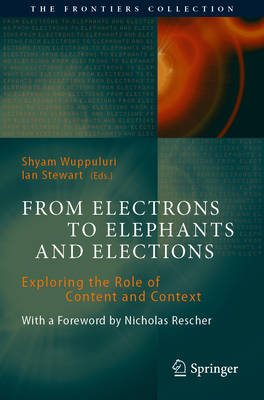
- Afhalen na 1 uur in een winkel met voorraad
- Gratis thuislevering in België vanaf € 30
- Ruim aanbod met 7 miljoen producten
- Afhalen na 1 uur in een winkel met voorraad
- Gratis thuislevering in België vanaf € 30
- Ruim aanbod met 7 miljoen producten
From Electrons to Elephants and Elections
Exploring the Role of Content and Context
Omschrijving
This highly interdisciplinary book, covering more than six fields, from philosophy and sciences all the way up to the humanities and with contributions from eminent authors, addresses the interplay between content and context, reductionism and holism and their meeting point: the notion of emergence. Much of today's science is reductionist (bottom-up); in other words, behaviour on one level is explained by reducing it to components on a lower level. Chemistry is reduced to atoms, ecosystems are explained in terms of DNA and proteins, etc. This approach fails quickly since we can't cannot extrapolate to the properties of atoms solely from Schrödinger's equation, nor figure out protein folding from an amino acid sequence or obtain the phenotype of an organism from its genotype. An alternative approach to this is holism (top-down). Consider an ecosystem or an organism as a whole: seek patterns on the same scale. Model a galaxy not as 400 billion-point masses (stars) but as an object inits own right with its own properties (spiral, elliptic). Or a hurricane as a structured form of moist air and water vapour. Reductionism is largely about content, whereas holistic models are more attuned to context. Reductionism (content) and holism (context) are not opposing philosophies -- in fact, they work best in tandem. Join us on a journey to understand the multifaceted dialectic concerning this duo and how they shape the foundations of sciences and humanities, our thoughts and, the very nature of reality itself.
Specificaties
Betrokkenen
- Uitgeverij:
Inhoud
- Aantal bladzijden:
- 876
- Taal:
- Engels
- Reeks:
Eigenschappen
- Productcode (EAN):
- 9783030921941
- Verschijningsdatum:
- 10/04/2023
- Uitvoering:
- Paperback
- Formaat:
- Trade paperback (VS)
- Afmetingen:
- 156 mm x 234 mm
- Gewicht:
- 1247 g

Alleen bij Standaard Boekhandel
Beoordelingen
We publiceren alleen reviews die voldoen aan de voorwaarden voor reviews. Bekijk onze voorwaarden voor reviews.








